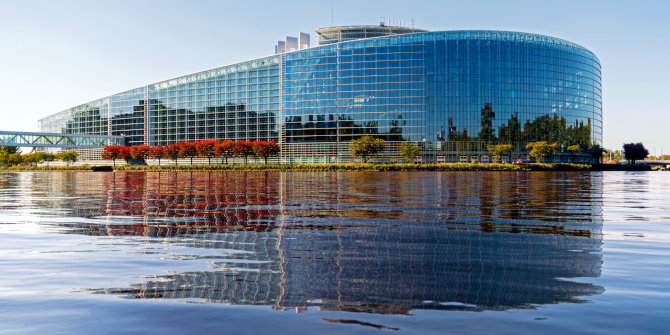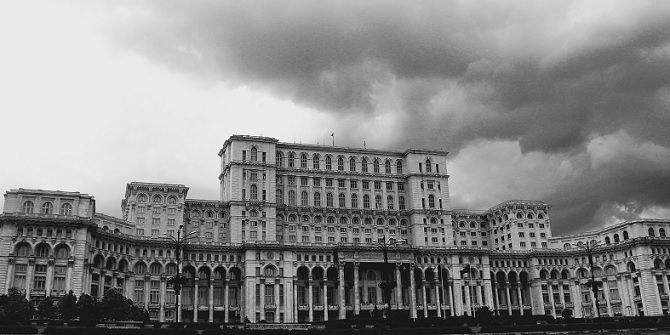
 The 2019 European Parliament elections will be held on 23-26 May. Ahead of the elections, we will be previewing the contest in all 27 EU states (assuming the UK leaves in March). In the first article of the series, Bianca Toma and Alexandru Damian discuss the elections in Romania, which will offer an opportunity for reformist groups to put pressure on the country’s government.
The 2019 European Parliament elections will be held on 23-26 May. Ahead of the elections, we will be previewing the contest in all 27 EU states (assuming the UK leaves in March). In the first article of the series, Bianca Toma and Alexandru Damian discuss the elections in Romania, which will offer an opportunity for reformist groups to put pressure on the country’s government.
The European elections in Romania will be an important test in the struggle between the reformist forces supported by an active part of society and the populist groups that have captured political power in the country and (partially) Romania’s state institutions.
The electoral campaign itself is expected to be unambitious and significantly hampered by domestic controversies. A clash between the governing coalition and the EU institutions over the rule of law and controversial changes to criminal legislation will continue to be under the spotlight. Anti-Brussels rhetoric is gaining ground and is being promoted by the ruling coalition’s representatives, despite Romania taking over the Presidency of the Council of the European Union at the start of January. Internal quarrels, such as who will better represent Romania to Brussels – the Prime Minister or the President – will significantly affect the country’s position and influence at the EU level.
Higher turnout: An inspiring signal for change
European elections have been affected by low turnout over the years, with 2014 hitting an all-time low of only 42.6% of Europeans taking part. Romania has been no exception with only around a third of voters casting their ballot at the last elections. This is higher than many other post-communist countries (the average turnout was 28.8% for these states in 2014), but it was still almost 10% lower than the EU average.
However, constant attacks over the judiciary, and recent unexpected emergency legislative measures targeting banks and/or foreign companies after prolonged pro-EU and pro-rule of law protests could boost the turnout this time around. Indeed, there is some hope that higher participation might provide a new turn for the political landscape, and could even inspire citizens from the neighborhood countries in Eastern Europe to challenge their autocrats, illiberals and nationalists.
The candidates – and their affiliates
The Romanian party system has become more divided and several new parties that are challenging the country’s mainstream will be contesting their first EU elections in 2019, either alone or in coalitions, with 33 MEPs set to be elected.
The Romanian Social Democrats (PSD), who are part of the Progressive Alliance of Socialists and Democrats (S&D) group in the European Parliament, are currently in power alongside a group of liberals affiliated with the Alliance of Liberals and Democrats for Europe (ALDE), but who are in a state of open conflict with ALDE’s Guy Verhofstadt. Corruption remains a major issue, with the government pursuing legislative changes that would reduce the power of anti-corruption prosecutors and the courts. The leader of the Social Democrats, Liviu Dragnea, has been convicted in two corruption cases and was investigated for European fund fraud in a third. Nevertheless, he has captured the levers of power in the party and remains in control of the government.
An informal cross-party group incorporating politicians that have been convicted or investigated for corruption has been pushing for the Prime Minister and the Minister of Justice to issue an emergency ordinance which would either grant amnesty or pardons to those investigated for criminality. The European Commission’s Frans Timmermans recently sent a letter to the Romanian authorities expressing concern over the ordinance and asking for clarification on the government’s intentions.
Through several legislative changes and with the help of the Constitutional Court, the criminal records of several senior politicians and high level public servants have already been considerably reduced. A list of social democrats supported by those who have been convicted for corruption offences will be on the S&D list in the 2019 European elections, with only mild sanctions being issued for repeated anti-democratic slippages in Bucharest.
The country’s main opposition, the National Liberal Party (which is affiliated to the European People’s Party – EPP), has been steadily increasing its support in the polls. A sharp increase is foreseen also for two other opposition parties, the Save Romania Union (USR), which is the third largest parliamentary party, and a newly established party set up by former agriculture commissioner, Dacian Ciolos, named Plus.
The former are set to sign an agreement on common lists. The other two are not yet affiliated to European political families, and the leaders of the two parties have taken into consideration negotiations with French President Emmanual Macron’s En Marche! movement. While this initiative is still awaited, talks between the USR and ALDE are already underway. Meanwhile on the left, a newly established party set up by former Social Democrat Prime Minister Victor Ponta, who is currently in open conflict with the PSD’s leader, will also be competing. Ponta’s party will include the current Romanian European Commissioner, Corina Cretu, on its list, and will be part of the S&D group.
Who will win the elections?
All polls suggest there will be a loss of support for the governing coalition and an increase for the opposition parties, with the Social Democrats most affected. The politico.eu projection also foresees a decline for the Social Democrats: the projected result of 27% would be a drop of 10% compared to 2014 and around 20% from the last Romanian parliamentary elections in 2016. ALDE Romania, the junior partner of the governing coalition, is expected to increase its vote share.
The opposition National Liberal Party are expected to win close to 25%, while the newly formed opposition parties, the Save Romania Union and the Plus Party, are expected to acquire between 15% and 20%. An alliance between the two could be confirmed by February: they were recently included in Politico’s list of new parties to watch.
The electoral campaign could well become derailed, however, by the anti-Brussels rhetoric being promoted by the governing coalition – which is something of a first for Romanian politics. Some of Romania’s most influential politicians have recently expressed strong criticism of the EU. Dragnea has accused the EU of discriminatory treatment, stating that “Romania will no longer accept being treated as a second-rate country”. He has also challenged a report by OLAF (the European Commission’s anti-fraud body), which accused him of fraud. Romania’s Prime Minister, Viorica Dăncilă, also struck a tone of defiance in a recent hearing in the European Parliament, indicating that “I am not here to give account. I request respect for Romania”.
The leader of ALDE Romania, Călin Popescu-Tăriceanu, who is serving as Head of the Senate and is a former Prime Minister, sent a public letter to the EU institutions following Romania’s last Cooperation and Verification Report on the judiciary. He accused the EU institutions and his own European political family “of practices that remind us, the Romanians, of totalitarianism”. Most recently, he criticised the European Commission for “having a legitimacy crisis when dealing with Poland, Hungary and Romania”, clearly suggesting that the three countries are being treated unfairly by the Commission, while suggesting the Romanian President is simply “a vassal”.
Despite Romania’s assumption of the rotating Presidency of the Council of the European Union, EU topics will continue to have a limited presence on the public agenda. Turnout could have an important impact on the result and, under usual conditions, a high turnout tends to favour the opposition parties. This will be the first real test for the mainstream parties following two years of controversial and highly criticised political measures which led to widespread street protests. And the elections will ultimately set the stage for the critical national elections set to come: including presidential elections later this year, and the next legislative elections.
Please read our comments policy before commenting.
Note: This article gives the views of the authors, not the position of EUROPP – European Politics and Policy or the London School of Economics. Featured image: Romanian parliament building, Credit: Les Haines (CC BY-SA 2.0)
_________________________________
 Bianca Toma – Romanian Centre for European Policies
Bianca Toma – Romanian Centre for European Policies
Bianca Toma is the Programs Director of the Romanian Centre for European Policies coordinating good governance, justice and EU Affairs projects. She had covered Brussels politics as EU Affairs correspondent for the mainstream Romanian media.
 Alexandru Damian – Romanian Centre for European Policies
Alexandru Damian – Romanian Centre for European Policies
Alexandru Damian is a Researcher at the Romanian Centre for European Policies. He is involved in projects related to foreign affairs, the Eastern Partnership, the judiciary and anti-corruption. He is a graduate of Political Science and has an MA in EU Studies from the Free University of Brussels.





I’m Romanian working and living in the UK for 11 years paid taxes from my very first day.I don’t think UE is doing enough to put the corrupt ones behind bars but they are putting them in charge in high roles which is sick .We’ve got a verry sick parliament, corrupt and not interested about their own people and still after so many years since ’89 nothing has changed. All PSD+ALDE they need locking up for corruption and using their job in their own interests. Thank you for make me feel NOT a PROUD ROMANIAN